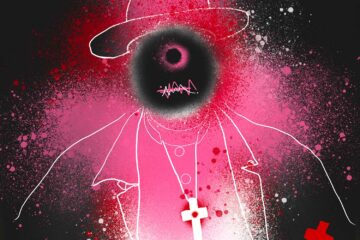Overview: In this short solo episode (ep 138), Adam Williams pulls out a helpful piece of the best-selling author Steven Pressfield’s book, “The War of Art,” noting key distinctions between worldviews of the artist and the fundamentalist. (Released on podcast on Feb. 20, 2023)
Also on Apple, Spotify, Pandora, Stitcher, YouTube, Google and other players.
EP 138 SHOW NOTES, LINKS & TRANSCRIPT
Connect with Adam Williams
Humanitou on Instagram: @humanitou
About Adam
Artwork
Podcast cover art & art above: Adam Williams
Music
“Old Rope” by Joe Johnson | joejohnsonsings.com
Original Written Version
In The War of Art, Steven Pressfield speaks to the essential conflicts between fundamentalists and artists. While, in general, I return to the book as a resource for many reasons, I have found the chapter, “Resistance and Fundamentalism,” especially to be clarifying for me in recent years.
Lately, I’ve been thinking, in particular, about the section explaining fundamentalism as I’ve felt a surge of energy to break free from conventions and rules, and freely express myself creatively.
I’m experiencing a post-hiatus renewal of motivation to break through Resistance, that capital-R Resistance we face in our inner creative battles. Resistance as undermining force is the focus of The War of Art.
Pressfield’s breakdown of art and fundamentalism has been useful to me not only in sorting through my inner and outer challenges with Resistance as an artist, but as a human in this time of contrived dumpster-fire culture war in America.
I had the opportunity to talk with Steve on the Humanitou Podcast, and I brought up fundamentalism with him around the 57-minute mark.
Listen to my conversation with Steven Pressfield on the Humanitou podcast.
Here is an abridged version you can read from the chapter “Resistance and Fundamentalism” in Steven Pressfield’s book, The War of Art:
“The artist is grounded in freedom. He is not afraid of it. … He has a core of self-confidence, of hope for the future. He believes in progress and evolution. …
“The fundamentalist entertains no such notion. … The fundamentalist (or, more accurately, the beleaguered individual who comes to embrace fundamentalism) cannot stand freedom. He cannot find his way into the future, so he retreats to the past. … He gets back to basics. To fundamentals. …
“The humanist believes that humankind, as individuals, is called upon to co-create the world with God. This is why he values human life so highly. In his view, things do progress, life does evolve; each individual has value, at least potentially, in advancing the cause. The fundamentalist cannot conceive of this. In his society, dissent is not just crime but apostasy; it is heresy, a transgression against God Himself. …
“The paradox seems to be, as Socrates demonstrated long ago, that the truly free individual is free only to the extent of his own self-mastery. While those who will not govern themselves are condemned to find masters to govern over them.”


